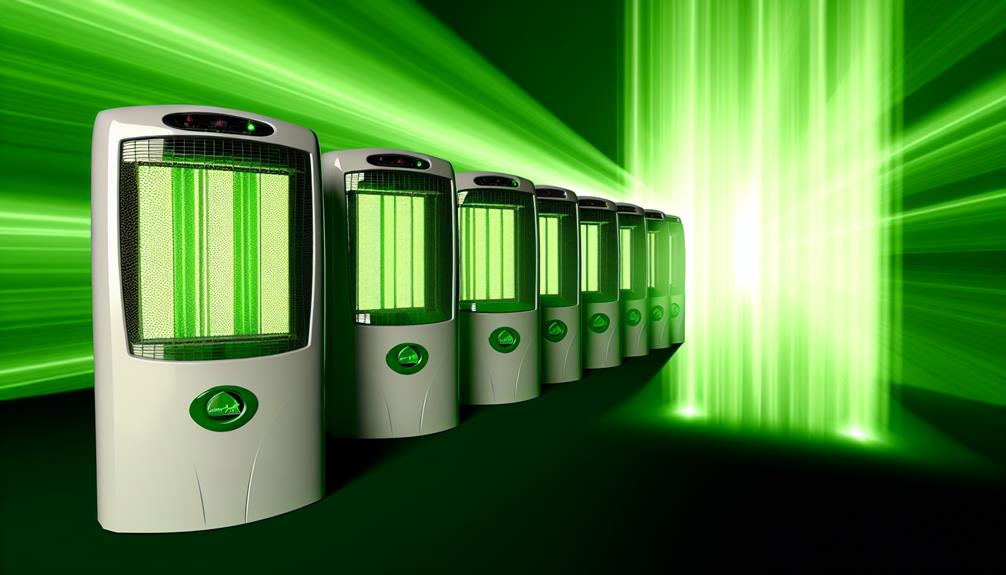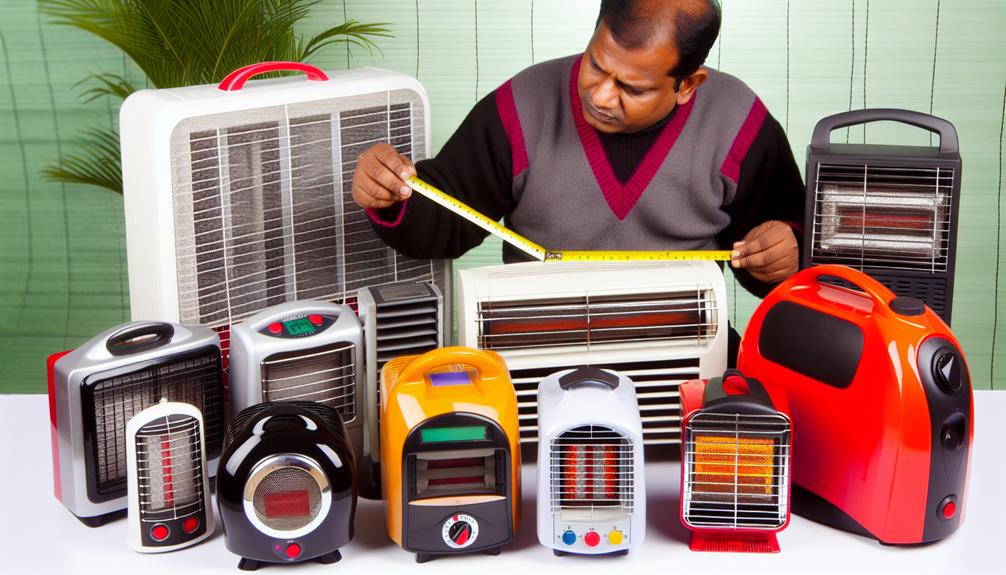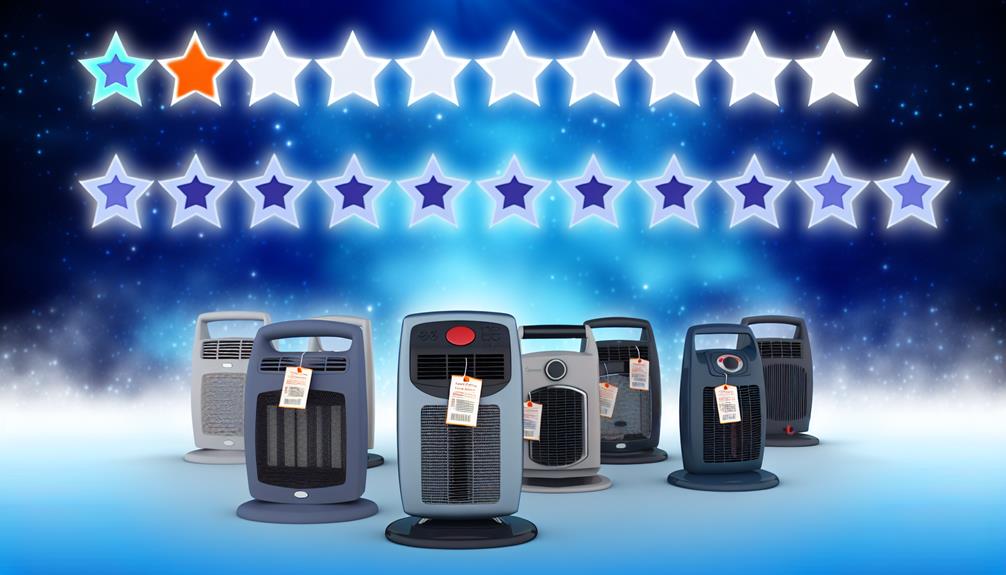As the chilly season approaches, you might find yourself pondering over the multitude of portable heaters on the market, each promising to fend off the cold with the push of a button. Choosing the right one isn't just a matter of picking the hottest option; it's about finding a balance between efficiency, safety, and suitability for your space. You'll need to consider the size of the area you wish to heat, the type of heater that aligns with your needs—be it convection or radiant, and the energy consumption that best fits your budget. Remember, the ideal heater not only warms your toes but also ensures your peace of mind with robust safety features. So, as you weigh the convenience of a portable heater against the complexity of its features, let's explore what it takes to select a unit that promises to serve you best when the temperature drops. Stay tuned for insights that aim to equip you with the knowledge to make a well-informed decision that will keep you cozy through the winter months.
Key Takeaways
- Calculate the temperature rise and measure the cubic footage of the space to determine the necessary BTUs and wattage.
- Pay attention to sizing recommendations that match wattage to square footage and choose a heater appropriate for the room size.
- Consider the different types of portable heaters available and their specific heating methods.
- Take into account energy efficiency considerations, safety features, and additional factors such as programmable thermostats and ease of movement.
Assessing Your Heating Needs
To accurately determine the wattage required for your portable heater, start by calculating the temperature rise needed for your specific space. You'll need to measure the difference between the current temperature and your desired temperature. This will inform your heating needs and guide you in choosing the best space heater.
Next, consider the room size by measuring the cubic footage of the area you wish to heat. This volume, when multiplied by 0.24, gives you the British Thermal Units (BTUs) necessary to achieve a consistent temperature. To convert BTUs to watts—a more common measurement for portable heaters—divide by 3.41.
Bear in mind that different types of space heaters have varying energy consumption rates and safety features. These factors, along with the wattage and square footage relationship, are critical in ensuring efficient and safe supplemental heat.
When perusing a space heater buying guide, pay attention to sizing recommendations that match wattage to square footage. This ensures that your chosen heater will meet your heating needs without excessive energy consumption. Remember, a properly sized heater is key to maintaining a warm and inviting space during the colder months.
Types of Portable Heaters
Now that you've established the wattage necessary for your space, let's explore the different types of portable heaters available to meet those requirements. From convection heaters that provide quiet, whole-room heating, to radiant heaters that offer quick warmth by heating objects directly, the variety is vast.
| Type of Heater | Heating Method |
|---|---|
| Convection Heaters | Quiet, whole-room heating |
| Radiant/Infrared Heaters | Direct, object-oriented warmth |
| Fan-forced Heaters | Air distribution via fans |
| Wall Heaters | Permanent, room-specific heating |
| Combination Heaters | Both convection and radiant methods |
When it comes to space heater safety, it's crucial to consider the heating element. Convection heaters use a heating element to warm the air, which then circulates to increase the room's temperature. This method is typically more energy-efficient for space heating larger areas. Radiant heaters, on the other hand, bypass the air and directly heat objects and people, making them ideal for spot heating.
Choosing the best space heater involves weighing the wattage and square footage compatibility, along with the types of space heater that will best suit your environment. Portable Electric Space Heaters come in various forms, each with their own advantages. Consider the specifics of your space to determine the most efficient and effective heating solution.
Energy Efficiency Considerations

When selecting a portable heater, it's essential to consider its wattage and energy consumption ratings to maximize energy efficiency. The best space heaters balance powerful heating with lower energy use. By scrutinizing the type of space heater and its energy efficiency considerations, you ensure cost-effective operation. Using one with a built-in thermostat and overheat protection contributes to both safety and efficiency by maintaining a steady temperature and preventing energy waste.
Convection space heaters, for instance, circulate heated air throughout the room, often providing more uniform warmth. However, the amount of heat needed from these heaters can vary greatly depending on room size and insulation. Therefore, compare the wattage of different models and consider a space heater with a wattage appropriate for your space to avoid excessive energy consumption.
Furthermore, calculate the potential utility costs by multiplying the heater's wattage by your local energy rates. This calculation helps you anticipate the expense of using a space heater at least three months out of the year. By considering these technical details, you're better positioned to choose a heater that not only warms your space effectively but also aligns with your energy efficiency goals and budget.
Safety Features to Look For
While considering energy efficiency is crucial, don't overlook the safety features that can protect you and your home from accidents involving your portable heater. It's essential to adhere to safety guidelines when using these devices. For instance, always keep the heater at least three feet away from flammable materials to minimize fire hazard risks.
Avoid using extension cords, as they can overheat and create a fire hazard. Instead, plug your heater directly into the wall. Be mindful of carbon monoxide risks with combustion-based heaters and ensure proper ventilation to prevent the buildup of this dangerous gas.
Here's a detailed table highlighting the key safety features to look for:
| Feature | Benefit | Consideration |
|---|---|---|
| Tip-over protection | Shuts off if tipped, reducing fire risk | Essential if you have children or pets |
| Overheat protection | Prevents getting too hot, averting fire hazards | Crucial to avoid damage to combustible materials |
| Cool-to-touch exterior | Protects against burns | Important for user safety, especially with children or pets |
| Safety certifications | Ensures meeting of safety standards | Look for labels from recognized testing labs |
| Sturdy base | Reduces tipping chances | Adds stability to prevent potential accidents |
Heater Size and Portability

Considering the space's volume and the heater's BTU (British Thermal Unit) capacity is critical for efficient heating, ensuring you select a portable heater that's both appropriately sized and easy to move to suit various room dimensions. When you choose a space to heat, it's essential to consider the size of the area. Large rooms require a heater with a higher BTU rating to maintain a comfortable room temperature.
For instance, a standard 10 x 12 room may need a space heater at least three times smaller than one designed for an expansive living area. To find the right heater for your needs, compare the heater's BTU output with the cubic footage of the space you want to warm. This will give you an indication of the heater size and portability required to effectively and efficiently heat the space.
Portable electric heaters are available in various sizes and with different BTU outputs. The key is to select a portable heater that offers a balance between its physical dimensions and its heating capacity. An oversized unit can be cumbersome and inefficient in small spaces, while an undersized heater won't adequately warm large rooms. Always opt for a model that allows for easy movement between locations without sacrificing heating performance.
Additional Heater Functions
Beyond size and portability, it's essential to explore the additional functions that can enhance your portable heater's usability and safety. When you're in the market for a space heater, consider it not just as a supplemental source of warm air, but as an advanced tool equipped with features to improve both heating efficiency and air quality.
Here's what to look for:
- Programmable Thermostat: A thermostat allows for precise temperature control, ensuring your convection space or area heated by radiant methods remains at a comfortable level without wasting energy.
- Safety Features: Overheat protection automatically shuts off your portable electric heater if it gets too hot, and a tip-over sensor adds an extra layer of safety, crucial for preventing accidents.
- Heating Technologies: Decide between radiant heaters, which provide direct warmth, and convection heaters that circulate warm air throughout the room. Fan-forced options can offer quick heat distribution, while wall heaters are a more permanent, space-saving solution.
Each heater type uses different heating technologies, impacting both the heat distribution and the unit's overall energy efficiency. Review power and energy consumption ratings to ensure your choice aligns with your desire for cost savings while maintaining optimal heater functions. Remember, these details matter not just for comfort, but for the longevity and safety of your heating solution.
Price and Brand Comparisons

Frequently, smart shoppers prioritize finding the best value, meticulously comparing the prices and features of various space heater brands before making a purchase. Price and brand comparisons are essential to identify the heater that best meets your needs without overspending. Different models of heaters offer unique benefits, whether you're considering patio heaters for outdoor warmth, baseboard heaters for consistent indoor heat, tower heaters for focused warmth, or oil-filled heaters for long-lasting heat without the need for a fan.
When comparing, take note of the power per hour each model consumes as this directly affects your energy bills. Oil-filled heaters, for instance, tend to cost more upfront but provide energy-efficient service. Tower heaters might have a lower initial price but could cost more in the long run if they're less energy-efficient.
As you assess your options, don't forget to check online retailers who often have competitive prices. They might also offer seasonal sales, especially during off-peak times like spring or summer. Additionally, consider the cost of shipping and the retailer's return policy, as these can influence the overall value of your purchase. By being thorough in your research, you can ensure that you select a heater that offers the best combination of price, efficiency, and reliability.
Frequently Asked Questions
What Is the Most Effective Type of Portable Heater?
The most effective portable heater for you depends on heating efficiency, safety features, and energy consumption. Consider noise level, heater size, and climate adaptability, as well as durability concerns and maintenance requirements. Aesthetic appeal and warranty offers can also influence your choice. Assess your needs carefully to find a balance between functionality and convenience, ensuring you select a heater that's well-suited for your space and usage patterns.
How Do I Choose a Portable Space Heater?
Choosing a portable space heater isn't just about warmth; it's balancing heater safety and energy efficiency. You'll need to consider size considerations for your room, noise levels, and optimal heater placement. Prioritize temperature control and maintenance ease, along with design features that match your decor. Ensure the heating capacity aligns with your usage scenarios. A heater's effectiveness hinges not just on power, but on how well it fits into your life.
How Do I Choose the Best Heater?
To choose the best heater, prioritize heater safety features and energy efficiency. Consider the climate and heater size appropriate for your space. Factor in usage patterns, and don't overlook noise levels for comfort. Opt for a heater design that fits your aesthetics and ensures easy maintenance. Finally, balance your selection within your price range and opt for brands with positive reputations to guarantee reliability and quality in your purchase.
What Is the Best Wattage for a Portable Heater?
You'll want a portable heater that balances energy efficiency with your room size for optimal heat distribution. Look for a design with safety features appropriate for your climate and usage frequency. Consider heaters with lower noise levels, easy maintenance, and precise temperature control. Remember, the right wattage will vary; too high can waste energy, too low may not warm sufficiently. Find that sweet spot tailored to your space and needs.
